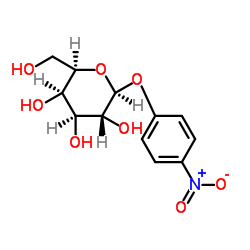对硝基苯基-β-D-吡喃半乳糖苷

对硝基苯基-β-D-吡喃半乳糖苷结构式

|
常用名 | 对硝基苯基-β-D-吡喃半乳糖苷 | 英文名 | 4-Nitrophenyl β-D-galactopyranoside |
|---|---|---|---|---|
| CAS号 | 3150-24-1 | 分子量 | 301.249 | |
| 密度 | 1.6±0.1 g/cm3 | 沸点 | 582.2±50.0 °C at 760 mmHg | |
| 分子式 | C12H15NO8 | 熔点 | 180-184ºC | |
| MSDS | 美版 | 闪点 | 305.9±30.1 °C |
|
The galactophilic lectin, LecA, contributes to biofilm development in Pseudomonas aeruginosa.
Environ. Microbiol. 8(6) , 1095-104, (2006) LecA (PA-IL) is a cytotoxic lectin and adhesin produced by Pseudomonas aeruginosa which binds hydrophobic galactosides with high specificity and affinity. By using a lecA-egfp translation fusion and immunoblot analysis of the biofilm extracellular matrix, we ... |
|
|
Engineering the genome of Thermus thermophilus using a counterselectable marker.
J. Bacteriol. 197(6) , 1135-44, (2015) Thermus thermophilus is an extremely thermophilic bacterium that is widely used as a model thermophile, in large part due to its amenability to genetic manipulation. Here we describe a system for the introduction of genomic point mutations or deletions using ... |
|
|
Cryptosporidium p30, a galactose/N-acetylgalactosamine-specific lectin, mediates infection in vitro.
J. Biol. Chem. 282 , 34877-87, (2007) Cryptosporidium sp. cause human and animal diarrheal disease worldwide. The molecular mechanisms underlying Cryptosporidium attachment to, and invasion of, host cells are poorly understood. Previously, we described a surface-associated Gal/GalNAc-specific lec... |
|
|
Binding of hydrophobic D-galactopyranosides to the lactose permease of Escherichia coli.
Biochemistry 41(43) , 13039-45, (2002) Binding of alpha- and beta-D-galactopyranosides with different hydrophobic aglycons was compared using substrate protection against N-ethylmaleimide alkylation of single-Cys148 lactose permease. As demonstrated previously, methyl- or allyl-substituted alpha-D... |
|
|
Tunicamycin inhibition of N-glycosylation of α-glucosidase from Aspergillus niveus: partial influence on biochemical properties.
Biotechnol. Lett. 32(10) , 1449-55, (2010) Treatment of Aspergillus niveus with 30 μg tunicamycin/ml did not interfere with α-glucosidase production, secretion, or its catalytic properties. Fully- and under-glycosylated forms of the enzyme had similar molecular masses, ~56 kDa. Moreover, the absence o... |
|
|
Evaluation of polyhydroxybenzophenones as α-glucosidase inhibitors.
Arch. Pharm. (Weinheim) 344(2) , 71-7, (2011) This experiment was designed to synthesize 18 kinds of polyhydroxybenzophenones by using Friedel-Crafts reaction, and to measure the inhibitory activity on α-glucosidase with p-nitrophenyl-β-D-galactopyranoside (PNPG) as a substrate. Here, acarbose (IC(50) =... |
|
|
A new beta-galactosidase with a low temperature optimum isolated from the Antarctic Arthrobacter sp. 20B: gene cloning, purification and characterization.
Arch. Microbiol. 191(11) , 825-35, (2009) A psychrotrophic bacterium producing a cold-adapted beta-galactosidase upon growth at low temperatures was classified as Arthrobacter sp. 20B. A genomic DNA library of strain 20B introduced into Escherichia coli TOP10F' and screening on X-Gal (5-bromo-4-chlor... |
|
|
Practical considerations when using temperature to obtain rate constants and activation thermodynamics of enzymes with two catalytic steps: native and N460T-beta-galactosidase (E. coli) as examples.
Protein J. 28(2) , 96-103, (2009) The values of the rate constants and the associated enthalpies and entropies of enzymes with two catalytic steps can be measured by determining the effects of temperature on the k (cat) values. Practical considerations that should be taken into account when d... |
|
|
Extraction, partial characterization, and storage stability of β-glucosidase from propolis.
J. Food Sci. 76 , C75-79, (2011) Extraction and assay conditions for β-glucosidase from propolis were optimized. Highest enzyme activity was obtained in a citric acid-disodium hydrogen phosphate buffer at pH 6.0 with 2.5% insoluble polyvinylpyrrolidone at incubation temperature of 57 °C. β-G... |
|
|
Properties of a recombinant beta-glucosidase from polycentric anaerobic fungus Orpinomyces PC-2 and its application for cellulose hydrolysis.
Appl. Biochem. Biotechnol. 113-116 , 233-50, (2004) A beta-glucosidase (BglA, EC 3.2.1.21) gene from the polycentric anaerobic fungus Orpinomyces PC-2 was cloned and sequenced. The enzyme containing 657 amino acid residues was homologous to certain animal, plant, and bacterial beta-glucosidases but lacked sign... |